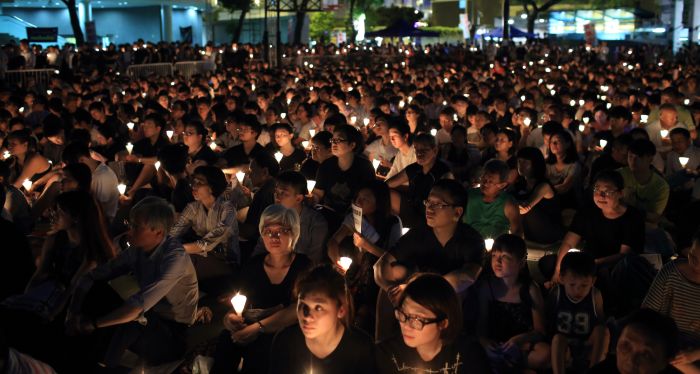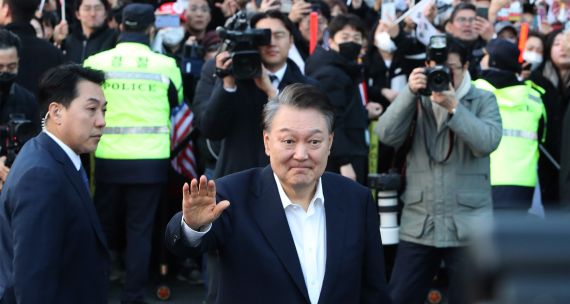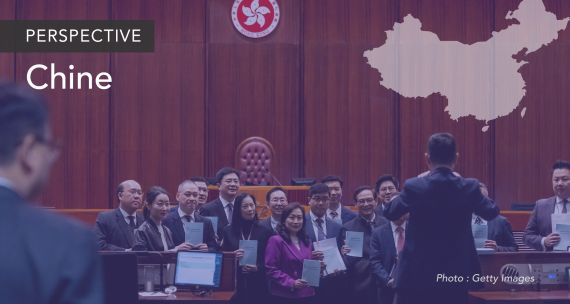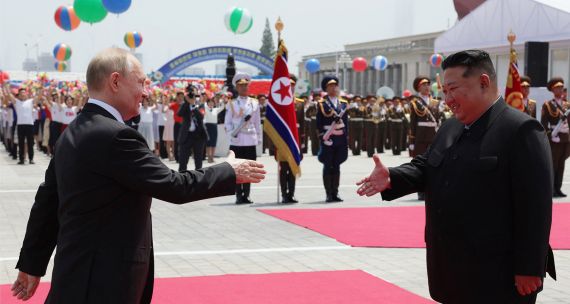On June 4th, the world commemorated the 30th anniversary of the 1989 Tiananmen massacre. In Hong Kong, a Special Administrative Region of the People's Republic of China, 180,000 people held a vigil, the largest gathering since the 25th anniversary of the pro-democracy uprising. This year’s Tiananmen anniversary took on a politically poignant tone for the people of Hong Kong as they face increasing authoritarian oversight from China, writ large in the form of a proposed new extradition bill that could see people in Hong Kong extradited to Mainland China.

A young woman reenacts the famous 'Tank Man' scene from the 1989 Tiananmen Square military crackdown on pro-democracy protesters in Beijing, in front of a replica of a Chinese tank in Hong Kong on June 4, 2014. More than 180,000 people took part in a candlelight vigil in Hong Kong on June 4 to commemorate the 30th anniversary of the bloody Tiananmen Square crackdown. | Photo: Alex Ogle/AFP/Getty Images
The proposed bill (The Fugitive Offenders and Mutual Legal Assistance in Criminal Matters Legislation (Amendment) Bill 2019) seeks to close a “loophole” in Hong Kong’s legal system that provides for extradition treaties with 20 other countries, but not with Mainland China, Taiwan and Macau. The crime that provided the catalyst for the bill was the murder of a 21-year-old Hong Kong woman in Taiwan by her 19-year-old boyfriend, also from Hong Kong.
The Hong Kong government cited the February 2018 murder case to propose legislation a year later that would allow the city to transfer criminal suspects to Taiwan and other places with which it lacks an extradition treaty – including Mainland China.
The bill has sweeping powers in that it would allow extradition of anyone residing or transiting through Hong Kong on a case-by-case basis. The underlying fear in Hong Kong is that dissidents, activists, and anyone travelling through Hong Kong could be arbitrarily extradited to Mainland China, which lacks an independent judiciary, has a history of torture, and of detaining dissidents. The bill has drawn harsh criticism from pro-democracy lawmakers, lawyers, and even some in the traditional pro-Beijing business community.
The negotiation of Hong Kong’s handover from the U.K. to China produced the Sino-British Joint Declaration, which states that Hong Kong’s capitalist system and way of life will remain unchanged for 50 years after the 1997 handover (i.e. until 2047). This principle is commonly expressed through the ‘one country, two systems’ maxim – that while there is only one China, there can be ‘two systems,’ thereby protecting Hong Kong’s governmental and economic model. The Basic Law, drafted from the Sino-British Joint Declaration, forms the constitution of the Hong Kong government and among many other things guarantees Hong Kong an independent judiciary, which closely aligns to British common law.
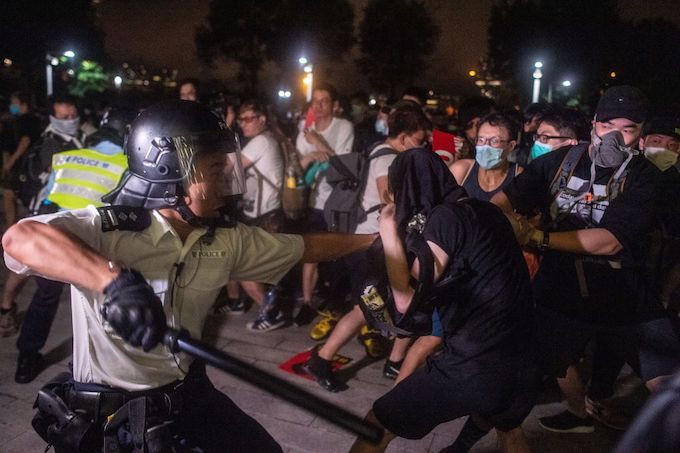
A police officer swings his baton as he restrains a protester during the clear up after the clash outside the Legislative Council in Hong Kong on early June 10, 2019. | Photo: Philip Fong/AFP/Getty Images
Following early criticism of the extradition bill through petitions, protests, and open letters, the Hong Kong government in an effort to appease critics’ concerns stated in early May that “political charges” (like protesting against the central government) would not be extraditable. However, China has a history of using corruption, tax evasion charges, or other dubious charges as a way of arresting dissidents and activists. Following a continued public backlash, further revisions were made at the end of May raising the threshold of extraditable maximum sentencing from three to seven years imprisonment and adding safeguards to protect human rights. The people of Hong Kong remained unconvinced, and the massive public rallies began.
On June 9th, organizers estimate over one million people participated in a mass protest denouncing the extradition bill, the largest protest in Hong Kong since the handover in 1997. Beyond Hong Kong, dozens of cities around the world – including London, New York, Toronto, and Vancouver – hosted their own demonstrations in support of Hong Kong. Unlike previous civil protests, like Occupy Hong Kong in 2014, which mostly involved students and pro-democracy activists, opposition to the extradition bill is widespread throughout Hong Kong society. In addition to activists, protesters also included families, retirees, and labour unions, all of whom view the bill as an unacceptable erosion of their autonomy and civil liberties.
Despite, the large-scale protest on June 9th, Beijing-backed Chief Executive Carrie Lam said on June 10th that she would continue to push through with the extradition bill. A second mass protest was organized, and on June 12, the day that the Legislative Council was to conduct the second reading of the bill, protesters surrounded Hong Kong’s Legislative Council Building, preventing lawmakers from entering and ultimately postponing the second reading of the bill. Hong Kong police ordered the protesters, whose number was estimated in the hundreds of thousands, to disperse. Which they did not. Police subsequently used tear gas and rubber bullets to clear the streets. Compared to the 79-day-long Occupy protests, the police fired twice the amount of tear gas and this time deployed rubber bullets. The excessive and repressive use of force – captured on millions of mobile phones and transmitted around the globe – has received international criticism and furthered endeared the protestors of Hong Kong to the rest of the world.
Given the sheer magnitude and unprecedented level of violence of the protests, high-level advisors and pro-establishment lawmakers called for a delay of the bill, and on June 15th Carrie Lam announced that she was going to postpone it indefinitely stating, “[w]e have no intention to set a deadline for this work and promise to report to and consult members of the Legislative Council panel on security before we decide on the next step forward.”
Again, this did not quell the concerns of Hong Kongers. A third protest was held on June 16th, with an estimated two million people marching in the streets of Hong Kong and calling for the scrapping of the controversial extradition bill. That protest also saw calls for Carrie Lam’s resignation and for changes to the government’s characterization of the June 12th protests as ‘riots,’ punishable by up to 10-year jail terms in Hong Kong. That night, the Hong Kong government issued a statement in which the Chief Executive admitted to “deficiencies in the government’s work” and apologized to the people of Hong Kong. Carrie Lam would further issue a personal apology on June 18th, in which she stated, “[The extradition bill] has led to controversies, disputes and anxieties in society. For this I offer my most sincere apology to all people of Hong Kong.” However, she did not kill the bill because her decision, she stated, was “tantamount to withdrawing the bill.”
The events unfolding in Hong Kong demonstrate a growing schism between the government and the people. Hong Kongers feel their freedoms are being slowly eroded and that the Hong Kong government’s priorities are to please Beijing rather than to solve the many problems in Hong Kong, including a lack of housing, unemployment, inequality, and social care.
